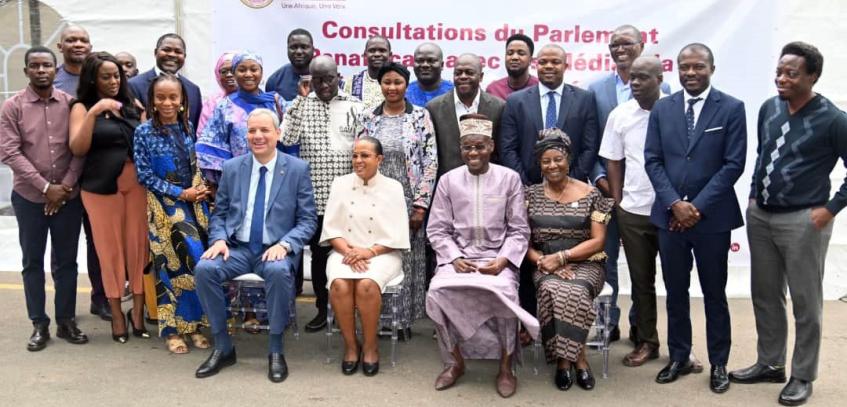The Pan-African Parliament (PAP) has launched a commemoration in Dakar to mark its 20th anniversary, with a resolute focus on preparing for the African Union’s 2025 theme, “Justice for Africans and People of African Descent Through Reparations.” Running from December 5 to 8, the event gathers leaders, civil society organizations, the media, and representatives from the diaspora to forge partnerships and amplify the call for justice across the continent and beyond.
The choice of Dakar, a city deeply tied to the history of the transatlantic slave trade, underscores the symbolic importance of this gathering. As a gateway to Gorée Island—a stark reminder of the atrocities of slavery—Dakar provides a poignant setting for discussions on restorative justice and reparations. The commemoration reflects on the structural and historical inequalities stemming from Africa’s past while emphasizing the Pan-African Parliament’s unique role in advocating for solutions that prioritize justice, equity, and a fairer future.
In her keynote address, Hon. Lucia Dos Passos, 3rd Vice President of the Pan-African Parliament, highlighted the Parliament’s central role in advancing the reparations agenda. She noted that this commemoration is a pivotal moment for the Pan-African Parliament to align its vision with the African Union’s 2025 theme. It represents not just a reflection on the Parliament’s achievements over the past two decades but also a forward-looking strategy to harness collective energy for justice.
“Dakar, with its indelible connection to Africa’s painful history, serves as a call to action for all stakeholders to turn historical reckoning into meaningful progress. As the deliberative body of the African Union, the Pan-African Parliament has a unique role to play in this process of restorative justice. Reparations are not limited to material or financial compensation; they represent an act of recognition, a commitment to correct structural inequalities, and a promise to build a fairer future for generations to come. To achieve this goal, we need to mobilize all the driving forces on our continent. That’s why this event focuses on the commitment of three strategic players: the African diaspora, the media, and civil society,” she stated.
The event emphasizes the importance of building synergies among these stakeholders, recognizing their pivotal role in amplifying the call for justice. Discussions have centered on how the African diaspora can serve as a bridge between the continent and global advocacy networks, how civil society organizations can channel grassroots demands into actionable policies, and how the media can shape public opinion to sustain momentum for reparative justice.
In 2024, the Pan-African Parliament and the Economic, Social, and Cultural Council (ECOSOCC) of the African Union mark a shared milestone of 20 years. This joint anniversary highlights two decades of advocating for legislative harmonization, social and cultural integration, and inclusive citizen participation in continental governance.
“ECOSOCC hopes that during our four days of intense discussion and reflection, significant progress will be made in this area, thanks to the potential for synergies and other forms of collaboration to be established between the Pan-African Parliament, ECOSOCC, and their various partners. The multi-stakeholder partnership strategy favored by the Pan-African Parliament is crucial to achieving the objectives of Agenda 2063 and the MDGs. As a reminder, Agenda 2063 crystallizes the aspirations of the African people to achieve, within a realistic timeframe, an integrated, prosperous, and peaceful Africa led by its citizens,” said Mr. Alpha Faye, Member of the ECOSOCC General Assembly.
Dr. Barryl Biekman, Chair and one of the founders of the African World Studies Institute based in the Netherlands, representing the diaspora, highlighted the alignment of the AU’s 2025 theme with the conclusion of the United Nations Decade for People of African Descent (2015–2024).
“This strategic focus underscores the importance of the diaspora in achieving the African Union's vision for justice, reparations, and integration into the broader Africa We Want framework under Agenda 2063. Platforms like the Pan-African Parliament will be critical in facilitating dialogue, strengthening advocacy, and driving legislative efforts to support the reparations agenda and justice for persons of African descent globally,” she said.
Gilbert Borketey Boyefio, Secretary General of the African Parliamentary Press Network (APPN), emphasized the critical role of the media in promoting the visibility and relevance of the Pan-African Parliament’s work.
“The visibility and relevance of the work of the Pan-African Parliament rely on its capacity to build strategic partnerships with the media, which has the platform to inform, educate, and shape the mindset of citizens. The APPN, as part of our mandate to make parliamentary information accessible to African citizens, has been working closely with the Pan-African Parliament to educate and inform the public about the work and activities of the continental parliament. Through this partnership, the Pan-African Parliament has organized numerous trainings for members of the media to build their capacity and enhance their understanding of the Parliament and its place within the African Union architecture. The APPN is poised to partner with the Pan-African Parliament to champion the AU’s 2025 theme,” said Mr. Boyefio.
Panelists and participants from across the continent and the diaspora present in Dakar for this activity have lauded the Pan-African Parliament’s commitment to advancing justice as a cornerstone of Africa’s transformative agenda under Agenda 2063: The Africa We Want. With its mandate as a continental legislative body, the Pan-African Parliament is uniquely positioned to harmonize frameworks, drive legislative advocacy, and champion the reparations agenda on the global stage.
The gathering will conclude on December 8, 2024, with a visit to Gorée Island, a UNESCO World Heritage Site that once served as a hub of the transatlantic slave trade. The visit will honour the resilience of Africa’s people and underline the urgent need for justice and reparations to heal the wounds of the past while laying the foundation for a more equitable future.








